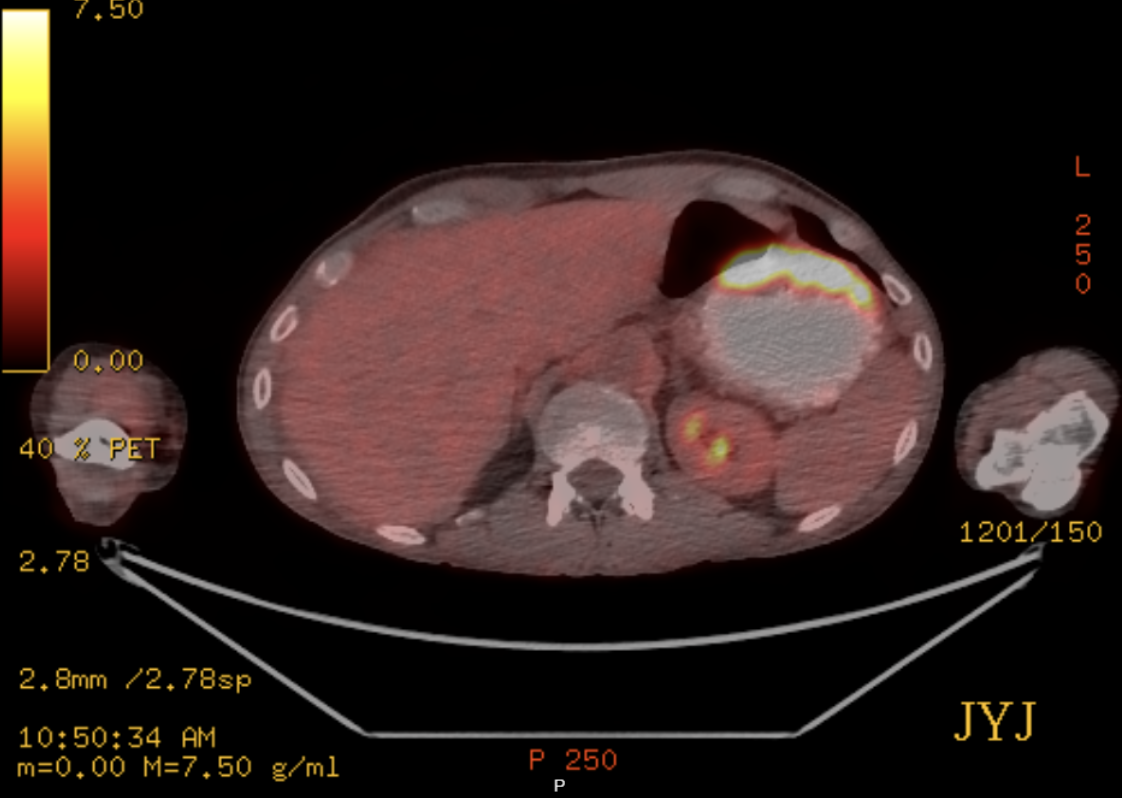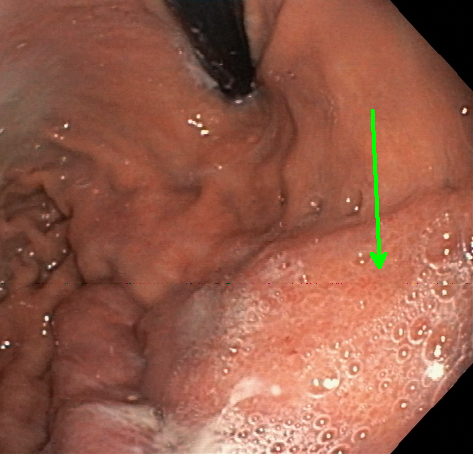Tuesday Poster Session
Category: General Endoscopy
P5182 - Tonsillar Metastasis to the Gastric Fundus
Tuesday, October 28, 2025
10:30 AM - 4:00 PM PDT
Location: Exhibit Hall
- HM
H. Reid Malcolm, DO, JD
Spartanburg Regional Healthcare System
Spartanburg, SC
Presenting Author(s)
William Harmening, BS1, H. Reid Malcolm, DO, JD2
1Edward Via College of Osteopathic Medicine, Spartanburg, SC; 2Spartanburg Regional Healthcare System, Spartanburg, SC
Introduction: Tonsillar cancer is one of the most prevalent malignancies of the oropharynx affecting more than 59,000 people in the US annually. Its incidence has been increasing since 2000, due to the rise in human papillomavirus associated cases, particularly HPV-16. Traditional risk factors include tobacco use, alcohol consumption, and poor oral hygiene. Metastasis to cervical lymph nodes is common, while distant metastases involves the lungs, bones, and liver. Metastasis to the gastrointestinal tract is extremely rare. Here we present a unique case of tonsil cancer with metastasis to the fundus of the stomach.
Case Description/
Methods: A 49-year-old male with a past medical history of rheumatoid arthritis presented with a right-sided neck mass first noted in April 2023. Initial evaluation revealed bilateral cervical lymphadenopathy, and fine needle aspiration confirmed squamous cell carcinoma of the right tonsil. Staging confirmed stage 3 disease. Treatment demonstrated initial remission, but in March 2025, he presented with new symptoms including a right neck mass, fatigue, and shortness of breath. PET imaging revealed new hypermetabolic disease in the chest, with right pleural effusion, upper lobe atelectasis, adenopathy, hypermetabolic bone lesions, and a new gastric mucosal lesion in the anterior fundus of the stomach. (Fig 1) He subsequently underwent mediastinoscopy with right sided aspiration and port placement. Biopsy from right lower paratracheal lymph node was positive for metastatic squamous cell carcinoma, HPV positive. Cytology from pleural fluid was also positive for malignancy. On March 19, 2025, he presented to the emergency department with hemoglobin of 4.4 and bright red blood from his PEG tube. He received four units of packed red blood cells. EGD revealed a large, ill-defined mass in the gastric fundus with no active bleeding. (Fig 2) Biopsy of the gastric lesion confirmed metastatic squamous cell carcinoma, consistent with the known primary tonsillar cancer.
Discussion: : The proposed mechanism of metastasis in our patient is through retrograde lymphatic spread or transcoelomic spread, although this not entirely understood. Metastasis from the tonsils most commonly affects the lungs, liver, and bones. Literature review only revealed 2 similar cases with consistent metastasis to the stomach. Our unique case demonstrates the rarity and complexity of metastasis of tonsillar cancer to the gastric fundus.

Figure: Positron Emission Tomography Image Showing Distant metastasis

Figure: Esophagogastroduodenoscopy Showing a Large Ill Defined Mass in the Gastric Fundus
Disclosures:
William Harmening indicated no relevant financial relationships.
H. Reid Malcolm indicated no relevant financial relationships.
William Harmening, BS1, H. Reid Malcolm, DO, JD2. P5182 - Tonsillar Metastasis to the Gastric Fundus, ACG 2025 Annual Scientific Meeting Abstracts. Phoenix, AZ: American College of Gastroenterology.
1Edward Via College of Osteopathic Medicine, Spartanburg, SC; 2Spartanburg Regional Healthcare System, Spartanburg, SC
Introduction: Tonsillar cancer is one of the most prevalent malignancies of the oropharynx affecting more than 59,000 people in the US annually. Its incidence has been increasing since 2000, due to the rise in human papillomavirus associated cases, particularly HPV-16. Traditional risk factors include tobacco use, alcohol consumption, and poor oral hygiene. Metastasis to cervical lymph nodes is common, while distant metastases involves the lungs, bones, and liver. Metastasis to the gastrointestinal tract is extremely rare. Here we present a unique case of tonsil cancer with metastasis to the fundus of the stomach.
Case Description/
Methods: A 49-year-old male with a past medical history of rheumatoid arthritis presented with a right-sided neck mass first noted in April 2023. Initial evaluation revealed bilateral cervical lymphadenopathy, and fine needle aspiration confirmed squamous cell carcinoma of the right tonsil. Staging confirmed stage 3 disease. Treatment demonstrated initial remission, but in March 2025, he presented with new symptoms including a right neck mass, fatigue, and shortness of breath. PET imaging revealed new hypermetabolic disease in the chest, with right pleural effusion, upper lobe atelectasis, adenopathy, hypermetabolic bone lesions, and a new gastric mucosal lesion in the anterior fundus of the stomach. (Fig 1) He subsequently underwent mediastinoscopy with right sided aspiration and port placement. Biopsy from right lower paratracheal lymph node was positive for metastatic squamous cell carcinoma, HPV positive. Cytology from pleural fluid was also positive for malignancy. On March 19, 2025, he presented to the emergency department with hemoglobin of 4.4 and bright red blood from his PEG tube. He received four units of packed red blood cells. EGD revealed a large, ill-defined mass in the gastric fundus with no active bleeding. (Fig 2) Biopsy of the gastric lesion confirmed metastatic squamous cell carcinoma, consistent with the known primary tonsillar cancer.
Discussion: : The proposed mechanism of metastasis in our patient is through retrograde lymphatic spread or transcoelomic spread, although this not entirely understood. Metastasis from the tonsils most commonly affects the lungs, liver, and bones. Literature review only revealed 2 similar cases with consistent metastasis to the stomach. Our unique case demonstrates the rarity and complexity of metastasis of tonsillar cancer to the gastric fundus.

Figure: Positron Emission Tomography Image Showing Distant metastasis

Figure: Esophagogastroduodenoscopy Showing a Large Ill Defined Mass in the Gastric Fundus
Disclosures:
William Harmening indicated no relevant financial relationships.
H. Reid Malcolm indicated no relevant financial relationships.
William Harmening, BS1, H. Reid Malcolm, DO, JD2. P5182 - Tonsillar Metastasis to the Gastric Fundus, ACG 2025 Annual Scientific Meeting Abstracts. Phoenix, AZ: American College of Gastroenterology.
